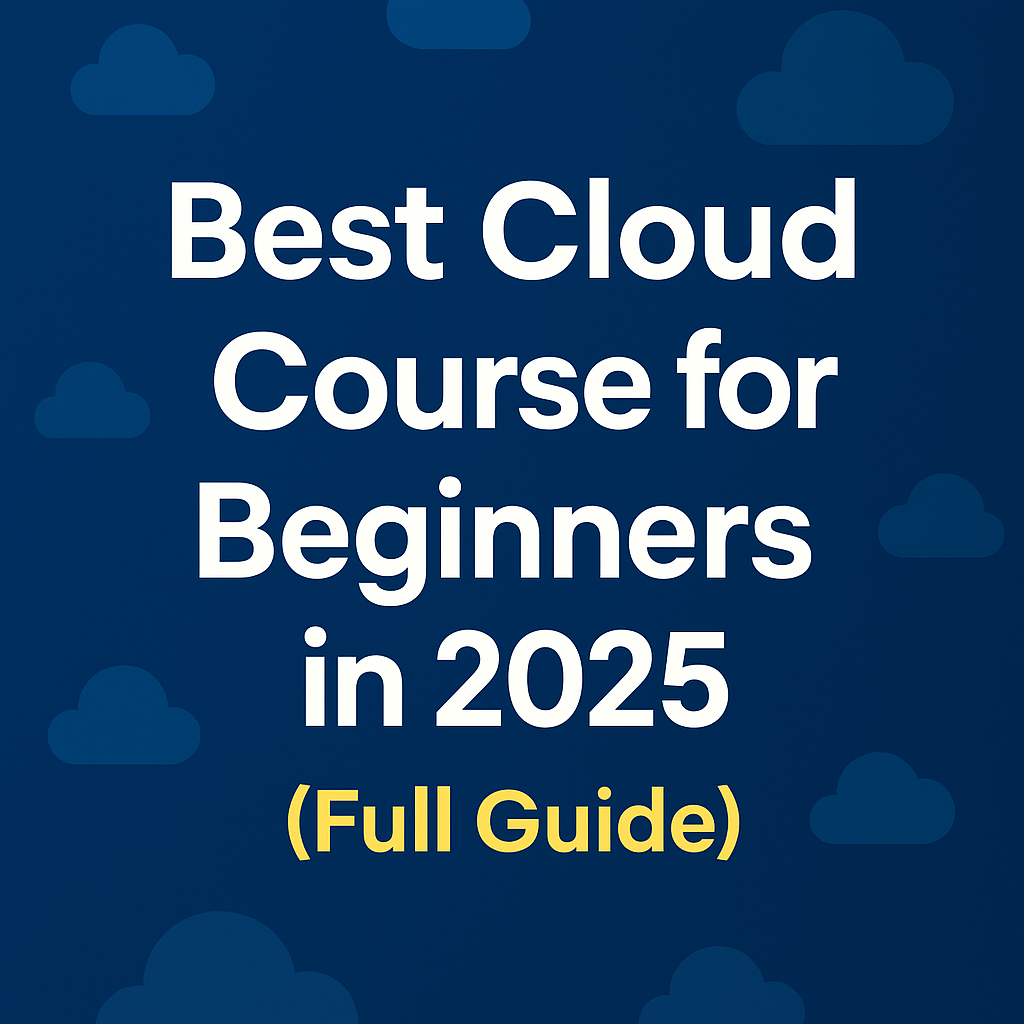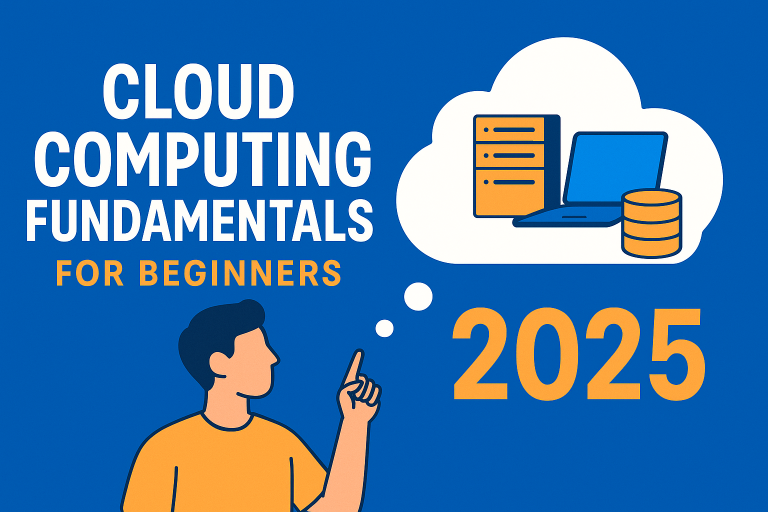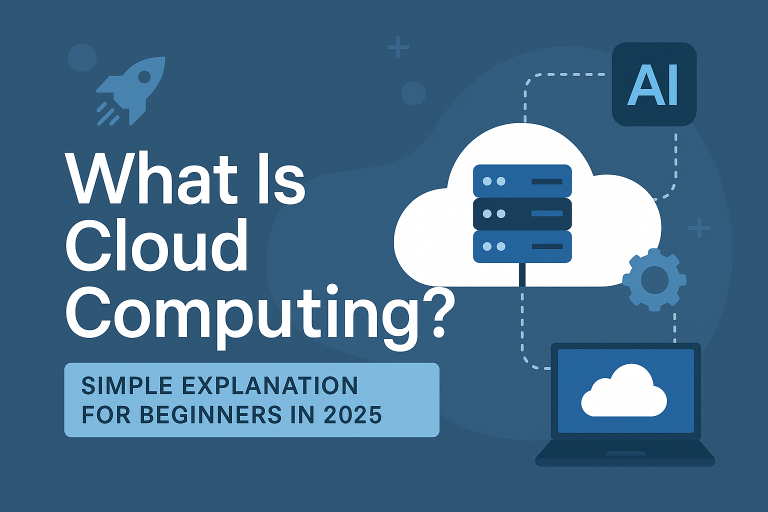Best Cloud Course for Beginners in 2025
If you’re looking for the best cloud course for beginners, you’re probably at one of two points: either you’re looking to start a career in tech from scratch (probably from a completely unrelated field, like teaching), or you’re already in the IT world and you finally want to level up into the cloud space. Either way, welcome—you’re in the right place.
I remember Googling everything from “What is the cloud?” to “Which certification matters?” And being overwhelmed by the sheer amount of info out there. One minute I was reading about AWS certs, the next I was watching a YouTube video about Google Cloud and what is like to work in that space, and then, next thing you know, I’m on Reddit, reading reviews that compare boot camps. In cloud and tech, everything moves fast. If you’re not careful, it’s very easy to get stuck with “analysis paralysis” or even worse, getting stuck in YouTube tutorial purgatory—learning a little bit of everything and mastering nothing.
That’s why I created this guide. Not just to list a bunch of courses, but to walk you through the smartest way to choose your first cloud course. I’ll break down which providers are best for beginners (Google Cloud, AWS, Azure), which platforms offer real hands-on experience, and how to avoid wasting time or money on training that doesn’t align with your goals.
Whether your dream is to become a cloud architect, get a remote role in the tech space, or just understand what the heck “the cloud” really means—this post is your launchpad.
👉 Want my top pick? Check out this beginner cloud course I personally recommend.
Table of Contents
🎯 What Makes a Cloud Course Ideal for Beginners?
Not all cloud courses are created equal—especially when you’re just starting. The best cloud courses for beginners do more than explain buzzwords like “IaaS” or “multi-cloud.” They guide you step-by-step through concepts, hands-on practice, and job-ready skills in a way that is easy to grasp, regardless of your background, or lack thereof, in tech.
Here’s what to look for when choosing your first course:
Clear, Jargon-Free Explanations
If you need a tech dictionary just to make it through the first module, it’s not beginner-friendly. A solid course should break things down in plain English—think real-world analogies, visual examples, and “why it matters” moments that stick.
Structured Learning Path
The best beginner courses take you from zero to confident. That means organized modules with a logical flow and clear progression—from understanding the basics of cloud computing to spinning up your first virtual machine or serverless function, with each step building on the last. The best courses follow a structured, logical path that takes you from completely cloud clueless to cloud confident.
Hands-On Labs or Practice Projects
Like many things, working in the cloud can’t be taught from a book alone. Yes, you can learn concepts, but the real learning doesn’t happen until you start building with it. Look for courses that include labs, sandboxes, or mini-projects using real cloud environments (Google Cloud, AWS, or Azure). At minimum, if the course doesn’t explicitly include labs or sandboxes, pick one where the instructor is in the cloud doing things on-screen, so you can follow along in a separate window. This builds muscle memory and helps concepts click faster.
Certification Readiness (Even If You Don’t Take the Exam)
Many beginner-friendly courses align with certifications like Google Cloud Digital Leader, AWS Cloud Practitioner, or Microsoft Azure Fundamentals. Even if you’re not planning to get certified right away, these courses are often well-structured and job-relevant.
Community and Support
Feeling stuck? A great course should offer support—either through a student forum, Slack group, or instructor Q&A. Learning cloud can get deeply technical, and extremely fast. You want to know you’re not alone when you hit a wall.
Real-World Use Cases
Bonus points if the course explains why something matters in real scenarios—like how cloud storage is used by companies, or what happens when a service fails. That context helps you think like a cloud pro early on.
Ready to dive deeper into cloud computing? Check out my complete Cloud Computing Fundamentals: Beginner’s Guide for more detailed insights, platform comparisons, and step-by-step advice to kickstart your cloud journey.
💼 Best Cloud Courses by Platform (Google Cloud, AWS, Azure)
There’s no shortage of cloud training out there, but the best course for you depends on where you want to start. Google Cloud, AWS, and Azure all offer great options for beginners—but they each have different strengths, are available on different platforms, and each has its unique learning curve.
Below, I’ll break down the best cloud courses for beginners by platform, including what I took, what stood out, and what I’d recommend if you’re just getting started.
Google Cloud
If you’re curious about Google Cloud, I’d start with the Google Cloud Digital Leader course on Coursera. It’s beginner-friendly, vendor-backed, and designed for non-tech learners who want to understand core cloud concepts without getting buried in code.
👉 Course Recommendation: Google Cloud Digital Leader – Coursera
It walks through topics like digital transformation with Google Cloud, modernizing infrastructure and applications, trust and security within Google Cloud, and innovating with Google artificial intelligence at a very accessible level. While I personally leaned more toward Udemy courses for my training, I did explore Google Cloud Skills Boost, and it’s a solid sandbox if you want hands-on practice with real GCP tools.
👉 Explore more: Google Cloud Skills Boost
AWS
For AWS, Amazon’s homegrown course is great! But if you want to supplement it with another course, which I highly recommend doing, Udemy has tons of beginner-friendly Cloud Practitioner courses that can be great choices. The right courses can help concepts click fast—especially when it comes to explanations of things like IAM, billing, and global infrastructure. The labs here won’t be overly complicated, and their courses are usually structured in a way that allows you to apply what you learned.
👉 Course Recommendation: AWS Certified Cloud Practitioner – Udemy
Azure
If Azure is calling your name, the AZ-900 prep course on Pluralsight is a popular starting point. It’s designed to help you pass Microsoft’s Azure Fundamentals certification and covers topics like pricing, support plans, and cloud concepts in the Azure ecosystem.
👉 Course Recommendation: AZ-900 Microsoft Azure Fundamentals – Pluralsight
That said—full transparency—I haven’t done hands-on work with Azure yet. So while I can’t vouch for the labs, I do think Microsoft Learn has a lot of solid free content to get your feet wet.
📚 Best Cloud Courses for Beginners: Top 5 Reviewed
There’s no one-size-fits-all when it comes to learning cloud—but some courses stand out above the rest. Whether you’re focused on Google Cloud, AWS, or just want to get a solid grasp of cloud computing in general, these are the best cloud courses for beginners I’ve seen (and in a few cases, taken myself).
Here’s a quick breakdown of the top 5, what they offer, and who they’re best suited for.
1️⃣ Google Cloud Digital Leader – Coursera
Best for: Total beginners exploring Google Cloud
What’s great:
- Taught by Google, so it’s accurate and well-structured
- No coding experience needed
- Explains core concepts like compute, storage, and security in plain English
Watch out for:
- Less hands-on unless you supplement with Skills Boost labs
- Not ideal if you’re planning to dive into engineering roles right away
2️⃣ AWS Certified Cloud Practitioner – Udemy
Best for: Beginners interested in AWS with zero experience
What’s great:
- Super digestible content with real-world examples
- Prepares you for your first certification (CCP)
- Strong community and high-quality practice exams
Watch out for:
- AWS pricing models can still feel confusing at first
- Labs are basic—you’ll need to explore deeper later
3️⃣ Microsoft Azure Fundamentals (AZ-900) – Pluralsight
Best for: Future IT pros or career switchers in Microsoft-heavy environments
- Covers both theory and platform-specific tools
- Excellent visual breakdowns of pricing, SLA, and services
- This can lead to Microsoft career paths like Azure Admin or Architect
What’s great:
Watch out for:
- Not as interactive as other platforms
- Labs may require Microsoft Learn to reinforce learning
4️⃣ Cloud Resume Challenge – LinkedIn Learning
Best for: People who learn by doing (and want a portfolio project)
What’s great:
- Teaches you how to build a cloud project from scratch
- Includes GitHub, CI/CD, infrastructure-as-code, and more
- Looks amazing on a resume or LinkedIn profile
Watch out for:
- It’s more advanced—best paired with another course
- Requires commitment (but worth it if you’re serious)
5️⃣ Cloud Computing for Beginners – edX
Best for: Learners who want a vendor-neutral cloud foundation
What’s great:
- Explains core cloud models (IaaS, PaaS, SaaS) across platforms
- Taught by university professors or cloud experts
- Flexible schedule, optional certificate
Watch out for:
- Slower pace than other platforms
- Less hands-on unless you combine it with lab tools like Qwiklabs
Pro Tip:
No matter which course you choose, pair it with hands-on labs and a personal project. That’s how you go from watching to actually doing—and that’s what recruiters are looking for.
🧩 Should You Learn Google Cloud, AWS, or Azure First?
If you’re just starting, one of the first decisions you’ll face is: which cloud platform should I learn first? Google Cloud, AWS, and Azure all offer solid opportunities, and you really can’t make a wrong choice here. I chose AWS at first because of my job and later switched because another job required domain expertise in GCP. Here’s the cool part—you don’t have to relearn everything if you switch vendors. A lot of cloud concepts apply to each vendor, so make a choice that makes sense to you and the career path you’re on.
Still struggling with this decision? No worries! Let’s talk through each one in a way that’s actually helpful.
My Unbiased Take:
- Google Cloud is beginner-friendly and has a clean UI, a very strong document database, and a design that typically appeals to startups, developers, and anyone who loves simplicity.
- AWS is the king of the hill and the most popular—it’s used by just about everyone and has the deepest ecosystem, which makes it perfect if you want maximum job options.
- Azure dominates the enterprise world, especially in companies already using Microsoft tools. If you’re in IT or planning to work in large corporations, it’s worth a look.
Beginner-Friendly Cloud Comparison
| Platform | Best For | Recommended Course |
| Google Cloud | Simplicity & innovation | 👉 Coursera – Google Cloud Digital Leader |
| AWS | Industry standard & breadth | 👉 Udemy – AWS Cloud Practitioner |
| Azure | Enterprise & .NET users | 👉 Pluralsight – Microsoft AZ-900 |
Still Not Sure? Here’s How to Choose:
- If you’re new to tech altogether, Google Cloud is probably the least overwhelming.
- If you’re aiming for job flexibility or DevOps roles, AWS is your best bet.
- If you’re already working in IT or a Microsoft-heavy company, Azure is the natural fit.
No matter which one you choose, you’re not locked in forever. Remember what I said about how concepts learned on one platform can usually be applied to another? Many cloud pros go multi-cloud down the line. But as a beginner? Pick one, stick with it, and go deep.
🛠 Hands-On Labs & Projects to Reinforce Learning
Like I said earlier, watching videos and reading books and docs will only take you so far. If you really want to get the cloud, you have to get in the cloud and start building in it. That’s where hands-on labs and beginner projects come in—and they’re non-negotiable if you want to go from simply knowing theory to building a real skillset.
I learned this the hard way. At first, all I did was passively watch courses, thinking I’d be able to learn everything simply by watching. All went well until I opened the Google Cloud Console and froze. The interface, the service names, the “IAM roles”… it all felt like a different language. But once I started following along with the course as they did things like spin up VM instances, deploy static websites, and put items in cloud storage, it all started to click.
Here are some ways to get your hands dirty (in a good way):
Best Platforms for Hands-On Labs
👉 Try Qwiklabs or Explore A Cloud Guru for real-world, guided cloud exercises.
- Qwiklabs (powered by Google Cloud Skills Boost) offers pre-configured sandboxes where you can follow step-by-step lab instructions without needing your own GCP account.
- A Cloud Guru offers similar guided labs for AWS and Azure, often paired with video walkthroughs and quizzes.
These labs walk you through deploying resources, setting up permissions, launching VMs, and even configuring serverless apps. It’s the closest thing to real-world practice without touching a company’s production environment.
Beginner-Friendly Project Ideas
Want to build something cool while reinforcing what you learn? Start here:
- Deploy a static website using GCP’s Cloud Storage
- Set up a virtual machine with firewall rules on AWS
- Build a budget tracker app connected to Firebase or Firestore
- Create an event-driven function using Cloud Functions or Lambda
- Use Terraform to provision basic cloud infrastructure
Not only do projects help lock in the material, but they also give you portfolio-ready proof of your skills. That’s a huge asset when applying for jobs.
Pro Tip: Blog about your projects or add them to GitHub, and include screenshots or architecture diagrams. Recruiters love to see initiative and proof of hands-on experience.
🧭 Career Paths After Completing a Cloud Course
So you’ve finished a beginner cloud course—what’s next?
This is where a lot of people get stuck. You’ve got the knowledge, maybe even a certificate… but you’re staring at job listings thinking, “Am I really qualified for any of this?” Been there. Done that. Imposter syndrome is real. Push through it.
The good news? You don’t need to be an expert to start your cloud career—you just need to be strategic.
What Jobs Can You Land After a Beginner Course?
Here are some entry-level or adjacent roles that often welcome cloud newcomers:
- Cloud Support Associate/Specialist – Help customers troubleshoot cloud services and basic configurations. Great entry point with most cloud providers.
- Technical Support Engineer – Provide first-level technical support for cloud products, escalating complex issues to senior engineers.
- Junior DevOps Engineer – Assist with deployment pipelines, basic automation, and infrastructure management in cloud environments.
- Cloud Security Analyst (Entry-Level) – Monitor cloud security tools, investigate basic alerts, and ensure compliance with security policies.
- Cloud Consultant (Associate Level) – Work with consulting firms to help clients plan and implement basic cloud solutions.
- Junior Cloud Administrator – Assist with managing cloud infrastructure, user accounts, and basic system monitoring under supervision.
- Technical Account Manager (Junior) – Build relationships with cloud customers, helping them adopt services and resolve issues.
These roles often require a mix of soft skills, foundational cloud knowledge, and a willingness to learn fast. If you’ve completed a structured course and built even a basic portfolio project, you’re already ahead of a lot of applicants.
Want to Stand Out? Build a Public Cloud Portfolio
One of the best ideas I’ve come across is the Cloud Resume Challenge—a project-based portfolio builder that shows employers you can actually do cloud, not just talk about it.
👉 Try the Cloud Resume Challenge
It walks you through building and deploying your resume as a live, cloud-hosted website.
Bonus points: it includes GitHub, CI/CD, Infrastructure as Code, and custom domains. I like this idea so much that I’m currently planning to build this myself as an enhancement to my own resume.
Job Prep Tools That Actually Help
If you’re starting to job hunt, don’t wing it. Use templates, guides, and prep tools that take the guesswork out of the process.
👉 Get access to this Cloud Career Accelerator — it includes ready-to-use resume templates, mock interview tips, and a roadmap to land your first cloud role fast.
Final Tip: Don’t stress about not knowing everything. Cloud is huge—and no one knows it all. Show you’re hungry, willing to learn, and able to prove what you know through small wins. That’s more valuable than any certificate alone.
💬 Real Student Reviews and Success Stories
Sometimes the best validation doesn’t come from course descriptions or flashy promo videos—it comes from real people who leaped, stuck with it, and saw results. Here’s what beginners are saying about the best cloud courses for beginners across Google Cloud, AWS, and Azure:
“What a great explanation with very detailed information for me as a newbie cloud learner.”
“This course is my second source after the AWS APN Learning Portal. I really enjoyed it and found it easy to understand every single topic and lab demo. I’m thankful to all the instructors who created and provided this course for helping so many Cloud Practitioner candidates around the globe.”
— Anton S., Udemy Student Review, A[NEW] Ultimate AWS Certified Cloud Practitioner CLF-C02 2025
“The course brought so much interest to supporting my goals in my journey…”
“I thought the information was delivered in a manner that was comprehensive and yet not overwhelming. The instructor, Samna, presented the material so well—it was user-friendly and easy to follow. Thanks so much, I really enjoyed the course.”
— Alma G., Coursera Student Review, Google Cloud Digital Leader Training
“It’s a perfect course for a beginner to start with AWS.”
“The explanation with the presentation helps an individual to understand it better.”
— Ravi K., Udemy Student Review, AWS Certified Cloud Practitioner – AWS Certification
“Less than 4 months after completing the Cloud Resume Challenge… I started my new career as a software engineer at Procter & Gamble.”
“I had only the AWS Cloud Practitioner certification at the time, but the project experience spoke volumes. Don’t give up! There will be days you want to quit. Just keep going—it’s worth it.”
— Cha’Diamond, via Cloud Resume Challenge
👉 Inspired? Join 1,000+ students already enrolled in these top-rated cloud courses and take the first step toward your cloud career.
Explore beginner cloud courses now →
🏁 Final Thoughts on the Best Cloud Course for Beginners in 2025
There’s no shortage when it comes to the best cloud courses for beginners—but when you’re just starting, clarity matters more than volume. The best cloud courses for beginners aren’t the flashiest or most expensive—they’re the ones that teach you real skills, build your confidence, and move you one step closer to landing a role.
Whether you’re switching careers, building a side skill, or just exploring the cloud for the first time, the biggest mistake is waiting too long to take action. You don’t need to know everything. You just need a place to start—and the right support to keep going.
🚀 Ready to take the first step?
👉 My top pick? Google Cloud Digital Leader on Coursera — it’s beginner-friendly, affordable, and gives you a solid foundation for any cloud career.
👉 Want more options? Browse all the top beginner cloud courses here and find the one that fits your goals.
💡 Final tip: Choose one platform, one course, and one goal. Then show up consistently. That’s how cloud careers are built—one focused step at a time







